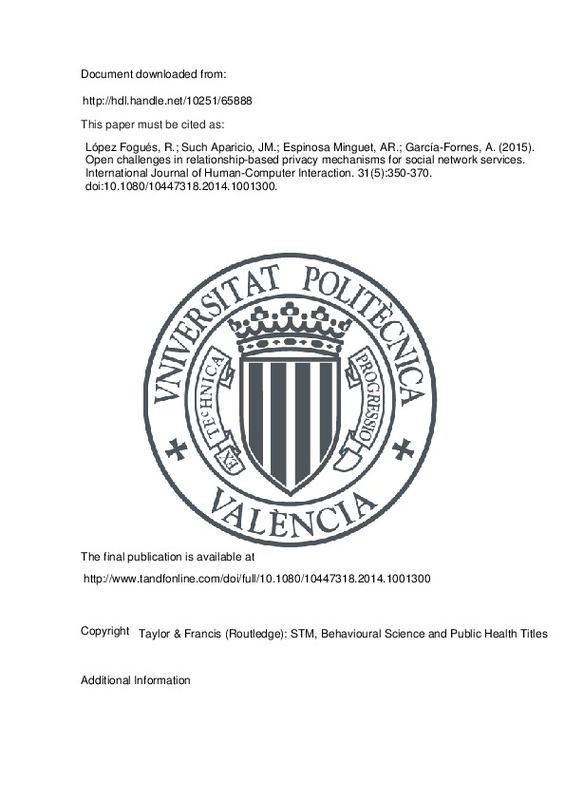JavaScript is disabled for your browser. Some features of this site may not work without it.
Buscar en RiuNet
Listar
Mi cuenta
Estadísticas
Ayuda RiuNet
Admin. UPV
Open challenges in relationship-based privacy mechanisms for social network services
Mostrar el registro sencillo del ítem
Ficheros en el ítem
| dc.contributor.author | López Fogués, Ricard
|
es_ES |
| dc.contributor.author | Such Aparicio, José Miguel
|
es_ES |
| dc.contributor.author | Espinosa Minguet, Agustín Rafael
|
es_ES |
| dc.contributor.author | García-Fornes, A
|
es_ES |
| dc.date.accessioned | 2016-06-14T13:35:54Z | |
| dc.date.available | 2016-06-14T13:35:54Z | |
| dc.date.issued | 2015-02 | |
| dc.identifier.issn | 1044-7318 | |
| dc.identifier.uri | http://hdl.handle.net/10251/65888 | |
| dc.description.abstract | [EN] Social networking services (SNSs) such as Facebook or Twitter have experienced an explosive growth during the few past years. Millions of users have created their profiles on these services because they experience great benefits in terms of friendship. SNSs can help people to maintain their friendships, organize their social lives, start new friendships, or meet others that share their hobbies and interests. However, all these benefits can be eclipsed by the privacy hazards that affect people in SNSs. People expose intimate information of their lives on SNSs, and this information affects the way others think about them. It is crucial that users be able to control how their information is distributed through the SNSs and decide who can access it. This paper presents a list of privacy threats that can affect SNS users, and what requirements privacy mechanisms should fulfill to prevent this threats. Then, we review current approaches and analyze to what extent they cover the requirements | es_ES |
| dc.description.sponsorship | This article has been developed as a result of a mobility stay funded by the Erasmus Mundus Programme of the European Comission under the Transatlantic Partnership for Excellence in Engineering-TEE Project. | en_EN |
| dc.language | Inglés | es_ES |
| dc.publisher | Taylor & Francis (Routledge) | es_ES |
| dc.relation.ispartof | International Journal of Human-Computer Interaction | es_ES |
| dc.rights | Reserva de todos los derechos | es_ES |
| dc.subject | Social networks | es_ES |
| dc.subject | Privacy | es_ES |
| dc.subject | Access control | es_ES |
| dc.subject | Tie strength | es_ES |
| dc.subject | Interpersonal relationships | es_ES |
| dc.subject | Selfpresentation | es_ES |
| dc.subject.classification | LENGUAJES Y SISTEMAS INFORMATICOS | es_ES |
| dc.title | Open challenges in relationship-based privacy mechanisms for social network services | es_ES |
| dc.type | Artículo | es_ES |
| dc.identifier.doi | 10.1080/10447318.2014.1001300 | |
| dc.rights.accessRights | Abierto | es_ES |
| dc.contributor.affiliation | Universitat Politècnica de València. Departamento de Sistemas Informáticos y Computación - Departament de Sistemes Informàtics i Computació | es_ES |
| dc.description.bibliographicCitation | López Fogués, R.; Such Aparicio, JM.; Espinosa Minguet, AR.; García-Fornes, A. (2015). Open challenges in relationship-based privacy mechanisms for social network services. International Journal of Human-Computer Interaction. 31(5):350-370. doi:10.1080/10447318.2014.1001300 | es_ES |
| dc.description.accrualMethod | S | es_ES |
| dc.relation.publisherversion | http://www.tandfonline.com/doi/full/10.1080/10447318.2014.1001300 | es_ES |
| dc.description.upvformatpinicio | 350 | es_ES |
| dc.description.upvformatpfin | 370 | es_ES |
| dc.type.version | info:eu-repo/semantics/publishedVersion | es_ES |
| dc.description.volume | 31 | es_ES |
| dc.description.issue | 5 | es_ES |
| dc.relation.senia | 282244 | es_ES |
| dc.contributor.funder | European Commission |







![[Cerrado]](/themes/UPV/images/candado.png)

